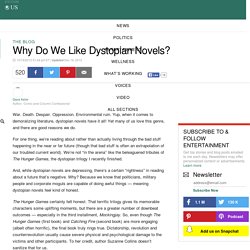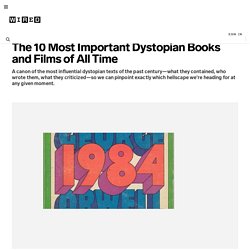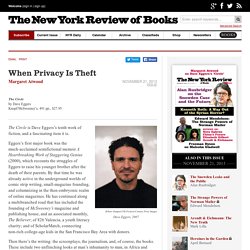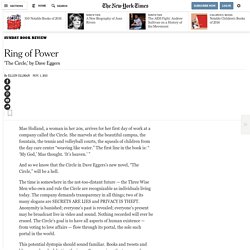

Rachel Botsman: We've stopped trusting institutions and started trusting strangers. Christopher Soghoian: Your smartphone is a civil rights issue. Why Do We Like Dystopian Novels? War.

Death. Despair. Oppression. Environmental ruin. Yup, when it comes to demoralizing literature, dystopian novels have it all! For one thing, we’re reading about rather than actually living through the bad stuff happening in the near or far future (though that bad stuff is often an extrapolation of our troubled current world). And, while dystopian novels are depressing, there’s a certain “rightness” in reading about a future that’s negative. The Hunger Games certainly felt honest. Other excellent dystopian novels are also filled with carnage, inhumanity, hopelessness and more. Sometimes, authors of dystopian literature temporarily ease the tension a bit with humor, as the great Atwood does with some of the clever genetic-engineering terms she coined for Oryx and Crake. We admire the best dystopian novels because they’re written well and depict people we can relate to.
What are your favorite dystopian novels, and why do you like them? This Blogger’s Books and Other Items from... The 10 Most Important Dystopian Books and Films of All Time. As far as we know, the word “dystopia” was first uttered back in 1868.

That’s when philosopher John Stuart Mill (piggybacking off his mentor Jeremy Bentham, who coined the word cackotopia for the same concept 50 years prior) used it in a speech ripping into the British government for its policies regarding Irish land. Now, 146 years, two world wars, thousands of texts, and countless technological advancements later, dystopia is looking pretty good for its age. It’s emerged from the larger pool of speculative fiction to be granted its own, if unofficial, subgenre, and the oft-cited “Dystopian YA fiction” trend has generated billions of dollars in recent years. But it hasn’t always held such status in the literary landscape. While the novel Brave New World has proven iconic over time, many science fiction writers at the time condemned Aldous Huxley’s criticism of pharmaceutical culture as puritanical—even H.G.
Now, go forth and worry. Capitalism/Social Complacency: E.M. Go Back to Top. Dystopian Elements and Basic Characteristics. The dystopian stories are often stories about survival, their primary theme is oppression and rebellion.

The environment plays important role in dystopian depiction. Dystopian stories take place in the large cities devastated by pollution. In every dystopian story, there is back story of war, revolutions, overpopulation and other disasters. The dystopian depiction is imaginary. Dystopian fiction borrows features from reality and discusses them, but it doesn't depict contemporary society in general. When Privacy Is Theft. The Circle by Dave Eggers Knopf/McSweeney’s, 491 pp., $27.95 The Circle is Dave Eggers’s tenth work of fiction, and a fascinating item it is.

Eggers’s first major book was the much-acclaimed semifictional memoir A Heartbreaking Work of Staggering Genius (2000), which recounts the struggles of Eggers to raise his younger brother after the death of their parents. By that time he was already active in the underground worlds of comic strip writing, small-magazine founding, and columnizing in the then-embryonic realm of online magazines. ‘The Circle,’ by Dave Eggers. Readers who enter the Circle’s potential Inferno do not have the benefit of Virgil, Dante’s guide through hell and purgatory, but they do have Mae, a naïve girl with the sensibility of a compulsive iPhone FaceTime chatterer.

(Oddly, Mae does not lead us through the ranks of programmers — let alone offer a glimpse of a woman programmer — a strange omission in a book purporting to be about technology.) Mae has been introduced to the Circle by her friend and former roommate Annie, who is close to the Three Wise Men. She begins work in lowly Customer Experience, providing boilerplate answers to client questions and complaints. Her performance is tabulated after every interaction, her ratings displayed for all to see. Mae is an eager competitor, earning a record score on her first day. Photo. The Circle by Dave Eggers – review. In a recent essay published in these pages, Jonathan Franzen inveighed against what he sees as the glibness and superficiality of the new online culture.

"With technoconsumerism," he wrote, "a humanist rhetoric of 'empowerment' and 'creativity' and 'freedom' and 'connection' and 'democracy' abets the frank monopolism of the techno-titans; the new infernal machine seems increasingly to obey nothing but its own developmental logic, and it's far more enslavingly addictive, and far more pandering to people's worst impulses, than newspapers ever were. " I cite this because it chimes with the points that Dave Eggers is making in his latest novel, The Circle; we are at an interesting moment when two such significant figures of American letters have both independently been so moved to expound on the same subject. But my guess is that Eggers won't suffer the same online crucifixion that has subsequently been Franzen's fate.
Why? There is much to admire.